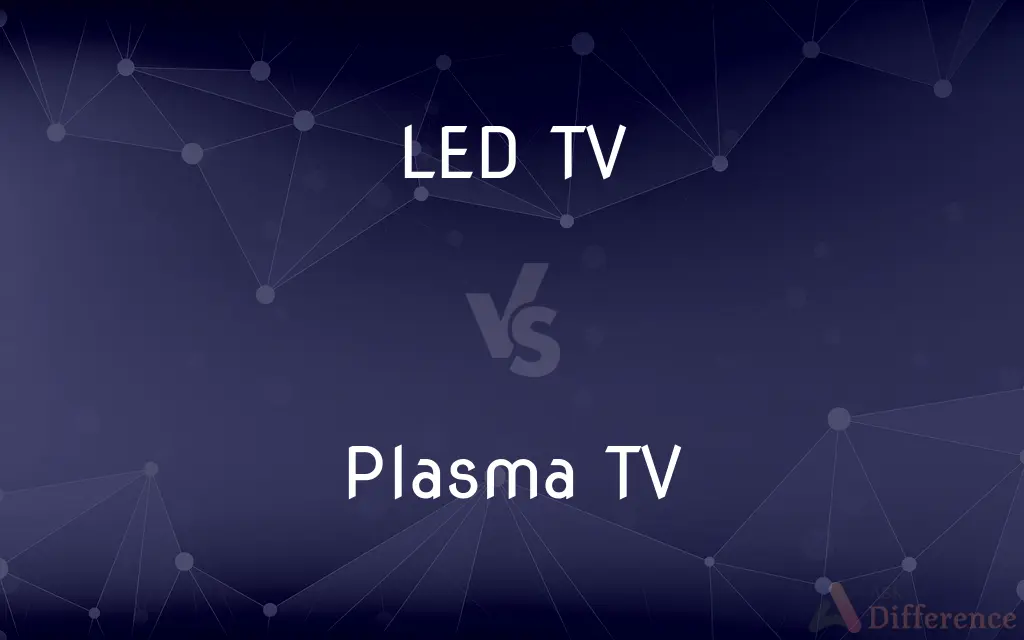LED TV vs. Plasma TV — What's the Difference?
By Tayyaba Rehman — Published on October 14, 2023
LED TV uses light-emitting diodes for backlighting, offering energy efficiency and bright displays, while Plasma TV uses ionized gas and phosphors to produce images, delivering better blacks and motion handling.

Difference Between LED TV and Plasma TV
Table of Contents
ADVERTISEMENT
Key Differences
LED TV, utilizing light-emitting diodes for illumination, excels in brightness and energy efficiency. Conversely, Plasma TV, with its ionized gas and phosphors, often presents deeper blacks and superior motion tracking.
Focusing on durability and lifespan, LED TV generally offers a more extensive range, owing to its solid-state technology. In contrast, Plasma TV, while delivering fantastic image quality, might not boast the same lifespan due to the inherent wear of its phosphors.
In terms of viewing angles, Plasma TV often surpasses LED TV, providing consistent image quality even from wider perspectives. However, LED TV compensates with often thinner builds and sometimes a more vibrant color spectrum due to varied backlighting technologies.
Energy consumption is a distinct divergence where LED TV tends to be more energy-efficient and cooler running. On the flip side, Plasma TV, while delivering robust images, typically consumes more power and generates more heat.
Regarding physical aspects, LED TV often comes in lighter and thinner designs, making them suitable for wall mounting. Plasma TV, while having been optimized over its lifespan, generally presents a heavier and thicker profile.
ADVERTISEMENT
Comparison Chart
Technology
Uses light-emitting diodes for backlighting
Uses ionized gas and phosphors to produce images
Energy Use
More energy-efficient
Tends to use more power
Display Quality
Offers bright displays, sometimes lacking deep blacks
Provides deep blacks and often better motion handling
Build
Typically thinner and lighter
Usually thicker and heavier
Lifespan
Often has a longer lifespan
Might have a shorter lifespan due to phosphor wear
Compare with Definitions
LED TV
LED TV utilizes light-emitting diodes for its display backlighting.
The LED TV in my room provides a brilliantly bright display.
Plasma TV
Plasma TV can excel in providing vibrant, color-accurate images.
The color accuracy of our Plasma TV makes movie nights exceptionally immersive.
LED TV
LED TV can come in ultra-thin designs and lightweight builds.
The slim design of our LED TV allows easy wall-mounting.
Plasma TV
Plasma TV generates images using ionized gas and phosphors.
The Plasma TV in our lounge delivers exceptionally deep blacks.
LED TV
LED TV often delivers a crisp, bright image, suitable for well-lit rooms.
Our LED TV provides clear visuals even in our sunny living room.
Plasma TV
Plasma TV can be heavier and thicker compared to modern LED TV models.
The robust build of the Plasma TV necessitated a sturdy stand.
LED TV
LED TV is known for its energy-efficient display technology.
We chose an LED TV to reduce our electricity consumption.
Plasma TV
Plasma TV is renowned for its excellent viewing angles.
From any corner of the room, the Plasma TV offers vivid images.
LED TV
LED TV may utilize various backlighting technologies like Edge or Full-Array LED.
Our LED TV features Full-Array backlighting for uniform brightness.
Plasma TV
Plasma TV provides smooth motion handling, suitable for fast-moving content.
Watching sports on our Plasma TV is visually seamless with no motion blur.
Common Curiosities
How does a Plasma TV produce images?
Plasma TV produces images using ionized gas and phosphors.
Is LED TV energy-efficient?
Yes, LED TV is generally more energy-efficient compared to Plasma TV.
What technology does LED TV use for display?
LED TV uses light-emitting diodes for display backlighting.
Which TV typically has better viewing angles, LED TV or Plasma TV?
Plasma TV generally has better viewing angles than LED TV.
How is the lifespan of LED TV compared to Plasma TV?
LED TV generally has a longer lifespan compared to Plasma TV.
What is a notable quality of Plasma TV’s image?
Plasma TV is known for producing deep blacks and vibrant colors.
Can LED TV be mounted on walls easily?
Yes, LED TV, being typically lighter and thinner, is suitable for wall mounting.
Is LED TV suitable for bright rooms?
Yes, LED TV is suitable for bright rooms due to its bright display.
Does Plasma TV provide good motion handling?
Yes, Plasma TV is often praised for its excellent motion handling.
Does Plasma TV consume more power than LED TV?
Yes, Plasma TV typically consumes more power than LED TV.
Share Your Discovery

Previous Comparison
Long Haul vs. Short Haul
Next Comparison
Current Assets vs. Liquid AssetsAuthor Spotlight
Written by
Tayyaba RehmanTayyaba Rehman is a distinguished writer, currently serving as a primary contributor to askdifference.com. As a researcher in semantics and etymology, Tayyaba's passion for the complexity of languages and their distinctions has found a perfect home on the platform. Tayyaba delves into the intricacies of language, distinguishing between commonly confused words and phrases, thereby providing clarity for readers worldwide.
















































